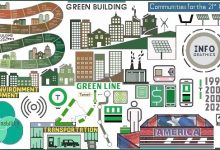
Round 1: “The present“
Within the framework of a crowdsourced project supported by Collective Intelligence Systems, the student participants were offered to take part in the discussion “After coronavirus: how will the world and conflicts change?”.
The students’ participation was designed as consecutive efforts to answer two questions: first, determine how the coronavirus pandemic is changing our society and the environment; and second, to outline potential future conflicts.
Many participants mentioned the challenges and the opportunities that arose in large cities under lockdown. In particular, our relationship with the environment has changed. Harmful emissions and mass consumption has reduced, and the media report sightings of wild animals on empty streets. The attention of the participants to environmental concerns is understandable in the light of the abnormal weather conditions we are facing and the global debates concerning the consequences of the new climate patterns.
On the other hand, some participants talked about social space restrictions in large cities on at international borders. The spread of the virus exacerbated the issues of insufficient social support and limited mobility regimes, in particular, for foreign labor migrants, as the lockdown was enforced and large cities turned into fortresses under siege that the government wished to isolate rather than conquer.
Notably, many participants mentioned that military terms may be suitable to describe the new everyday. Visually represented on the map, the spread of the infection, is conceived as a battle, and the last non-infected territories are the rear area of this war.
The participants also mentioned the collapse of the global space and the deterioration of the international commonality due to the spread of conspiracy theories, xenophobic tendencies and struggles related to resource distribution. These trends are further seen when the participants speak about the exacerbation of social gaps. Some participants mention the symbolic representation of these ideas: the cultural shift that led to the disuse of the classical handshake. An ancient sign of greeting, the handshake was a symbol of trust that the pandemic now destroys. Thus, the participants proclaimed the formation of a new ethics that appears as a reaction to and a processing of the lockdown.
Understandably, many participants spoke about the dynamic of psychological reactions to the pandemic, such as increase of anxiety, new practices of interacting with information and so forth. They also talked about methods of preserving psychological stability and the circumstances where they failed, such as the noted increase of domestic conflicts.
Among the political consequences of the pandemic, the participants noted the danger of keeping the extraordinary measures, designed to combat the pandemic, as the new normal. The participants fear that this may be the prologue to a new digital totality, such as is now established in China. On the other hand, the industrial society’s contradictions between employers and employees, rich and poor will still be relevant for all countries.
Among positive comments, the participants mentioned the development of gift economy projects, providing free universal access to museums, libraries, and education opportunities. Also the growing awareness of a shared danger that concerns everyone was noted: the rich and the poor, the developed and the developing countries.











